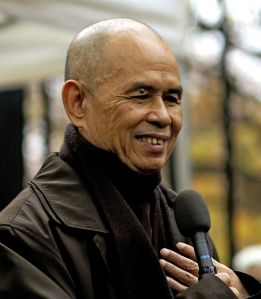 February
09
February
09
Tags
BookLab: What a Buddhist Monk Can Tell Us About Office Meetings
The Art of Communicating by Thich Nhat Hanh
Buddhism and business are no strangers to one another – Apple’s Steve Jobs and many other stellar CEOs have praised meditation for its part in their achievements.
Nhat Hanh is a renowned Vietnamese Buddhist monk who writes, paints, campaigned for peace during the Vietnam War, and has been nominated for the Nobel Peace Prize. He lives in France in a Buddhist community, Plum Village, where visitors are welcomed for retreats.
Buddhist monks crave quiet and they meditate. They dwell primarily on the inner life. So, drawn in by the title, I wondered what Nhat Hanh would have to say about communication. Would there be advice here that could be applied to modern life? Or even the corporate realm? Sometimes it feels as if a business meeting is where communication goes to die, and we should probably be open to all the help we can get in these situations.
The wisdom of Nhat Hanh has been sought by many powerful and successful people. He’s talked at the World Bank, been to Silicon Valley to visit Google, led a ‘day of mindfulness’ for 15 tech CEOs and, most recently, was praised as the unsung hero behind the recent Paris climate agreement.
The Art of Communicating may be short, but the book is certainly not light. There are no quick fixes or ‘10 speedy tips’ to be found here. But there is great clarity of thought and distilled wisdom between the covers. Page after page is full of noble ideals that would make almost every human interaction better.
Nhat Hanh writes about the ‘mantras of communicating’ and if we could capture the spirit of even one or two of them in a meeting, it would be an improvement.
I am here for you.
Yes, these may be words we can only imagine being spoken by Buddhists or Californians. But perhaps we should try to bear at least the sentiment in mind in a meeting. We are here around this table for others. What can we do that will help the other people present?
Nhat Hanh recommends regularly saying: ‘This is a happy moment.’
OK, it is often anything but happy around the conference table. But when things do go right in a meeting, and issues are resolved, more appreciation of the good outcomes can only be a good thing.
The specific advice offered by the wise man for meetings is: to relax and be open with one another and ‘trust that the best ideas will rise to the surface’.
This is a lovely, egoless idea that, as a result of the debate and brainstorming, the best ideas will rise. Too often, meetings are about conflicted interests, one person getting their way, and another being ignored. Whereas the best companies aim to foster creative and supportive environments and meetings are approached in a spirit of open-mindedness, in the hope of generating brilliant new directions and solutions.
There’s other valuable advice in this book to apply to daily office life. Relax. Be calm. Find small slices of the day to sit, breathe and concentrate only on drinking your tea.
Nhat Hanh does not sound like a man who multi-tasks or over-achieves. He believes in mindfully doing one thing incredibly well before moving on to the next.
So, next meeting, try bringing your tea, your focus, your calm. Leave your ego and tension behind, as these are the enemies of both the happy meeting and the happy outcome.


